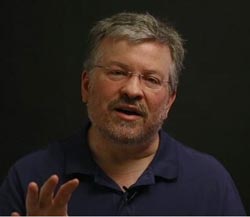 |
 |
| Joe Crump |
Kristina Wagner |
Interview With The Directors
Question: Kristina, tell us about your experiences on General Hospital and how it ultimately led you to documentary filmmaking.
Kristina: 25 years of General Hospital (with a few months off here and there) have proven to be a very valuable experience for me. I have loved playing the character Felicia Cummings, Jones, Shore, Jones, Scorpio. That character has allowed me to learn about life like no other way possible. Through working scenes every day ("everyday" the 1st 10 years at least), I have come to understand: call time, taping schedule, rehearsal, tape, filming, hitting marks, camera shots, lighting, hair, make-up, wardrobe, craft services, big budget, little budget, producers, directors, locations, the set, props, stage managers, crew, actors, friends, family and some acting. OK…. a lot of acting.
In 2006 I had a need to continue my education. I started taking classes at California State University Northridge. Eventually I changed my major to history. My senior thesis was on the Detainment of Americans during WWII. I had a special interest as to why the Germans have never been included in the history books. And, by the way, the Italians had their civil rights violated during that time too. For my thesis paper, I interviewed Heidi Gurcke-Donald and Eberhard Fuhr on the phone. Their stories are very detailed and gut-wrenching. Having been a "soap star" for the last 25 years, this was the first time I was doing the interviewing. I know from first-hand experience that the things that are said in an interview aren't always conveyed accurately with the final outcome. So I make it a priority to be as accurate with my documentary storytelling as possible.
Question: Joe, what is your background and how did it lead you to documentary filmmaking?
Joe: I graduated from film school (Columbia College – Chicago) in 1981 and worked in the industry for about 10 years before being sidetracked. I shot for CNN, did lighting and grip work for some major directors in Los Angeles, wrote educational and industrial films for pay and a dozen feature screenplays (on spec). After one of my projects got picked up by Fox in the mid-eighties, rewritten for a year and then dropped, I got a little irritated and decided I should make my own movie – I just had to get rich to do that (laughs) – at least that is what I thought at the time. That’s how I got sidetracked for 20 years – investing in real estate, building internet marketing businesses, losing sometimes, winning sometimes, and learning a lot from those lessons.
When my sister gave me her senior thesis to read, it was about a series of events that I had never heard of and I found very intriguing – especially since I saw so many current civil rights and “due process” issues repeating themselves in the world today. This was a project that needed to be done.
Honestly, doing this project and working with my sister has been a blast and we are already making a list of projects to shoot in the future.
Question: What is your purpose for this film about the internment camps? Why did you think it needed to be made now? What is it that you hope will come from creating this awareness?
Kristina: I want the public to know that the internment of American citizens, aliens and aliens from Latin America really did happen. Some suspects were guilty and some were not. The problem is that they all got caught in a dragnet of war-time hysteria. And what surprises me the most is that the suspect's families were allowed to join their so-called criminals. That would never happen today or would it? The government would never rope in a whole family if the father was suspected of a crime. Another surprise is that these so-called criminals were not given due process of law. They had no trial, just a quick make-shift hearing and then placed in a camp for the duration of the war or deported to Germany. It's unthinkable. Just because you look like the enemy, you are arrested. It even happened after 911. Muslims were suspected, their homes ransacked, bank accounts closed, and they were ostracized from the community. If you stick with the constitution as the founding fathers originally wrote it, people would have a fair trial. The Enemy Aliens Act of 1798 needs to be addressed and given proper attention.
Question: How it is working as brother and sister?
Kristina: It makes me feel safe, venturing out into a new career. It's like, you have a buddy by your side and the fortunate thing is that we kinda think alike. Our nephew, Michael, pointed out that once we get the film together, we should make sure we get some outside opinions. He's right. I really believe that it's important for the audience to walk away with the many perspectives of the internment programs. They can make up their own minds about how they feel about it.
Joe: We have a short hand when we work together because we have so much personal history. We both know why we are there – and there’s a lot of trust and flexibility as we try to discover this story. Doing a documentary is very different than my experiences working in narrative fiction. With fiction, you develop and mould the story before you shoot – with documentary; it reveals itself as the project unfolds. I think working this way fits my personality better – I love the journey, the exploration and Kristina has been a great travelling companion – and she’s funny as hell.
Question: Anything you want to say about the accused?
Kristina: In an interview with one of the internees, he pointed out that there were three factions in the camps. One would be the faction of, politically, Nazis. I asked, "Did the pro-Nazis on American soil know what was going on overseas in the Jewish concentration camps? And if a loyal Nazi was indeed loyal to the movement, Wouldn't they have read Mein Kampf? Wouldn't that book make it perfectly clear how a Nazi would view another race that was not Aryan? The other faction that was mentioned was the people who looked to Germany as their fatherland, as their homeland, you know. They had parents over there or brothers or sisters. They looked at Germany as their country, just like we look at our county, the good 'ole U.S.A. as our country. And then there were those that were pro-American in the camp. These were the 3 factions that existed in all of the camps across the country and in Latin America. There were camps run by the U.S. Department of Justice, temporary detention facilities, United States Army internment facilities, Forest Camps, Latin American Detention facilities, and State Department related sites like in hotels and resorts. Most of the internees passed through a series of these facilities, depending on their status in the internment/repatriated/deportation process, whether they were interned with family members, their own gender or their status as citizens.
Joe: I have the belief that the guys who imprisoned these folks never believed the detainees were criminals, but put them in prison as a prophylactic measure to ease their fears and the fears of the country. Would we allow families to live with criminals in our current prison system – even if it’s voluntary? I haven’t found one person who thinks we should. It might be a good thing to have prisoners in a real society rather than a prison environment so they can learn how to live responsible lives, but probably wouldn’t be such a great idea for the families that had to live with them. I don’t think the families would have been allowed in these camps if the men who put them there thought they were guilty of criminal activity. Since there was never “due process” in the convictions of the detainees, we will never know how their innocence would hold up in court. As an American, I expect the laws of the land to apply, not just to me, but to everyone who lives in this country.
Question: What do you think about the legislative efforts the government has made to give these internees federal recognition?
Kristina: Well….first of all I applaud them for acknowledging the Japanese who were interned. In 1988 the Civil Liberties Act was enacted. However, in December 2010, the Wartime Treatment Study Act died in the 111th Congress. It never got voted out of the committee. So….the Germans have yet to be acknowledged for wartime civil liberties violations. Most of the internees that Joe and I interviewed did their own research. They went to the National Archives and records from the Department of Justice and found legal documents that prove their mother or father was not given a fair trial after being accused of conspiring against America during WWII. I want the country that I hold dear, the United States of America, to step up and acknowledge this.
Question: What recommendations would you give to other filmmakers who are just getting started, about finding financing and finding an audience for your work?
Joe: It’s not very expensive these days to make a movie like ours. Our biggest costs are equipment, travel and some post production and licensing expenses – and we are splitting these costs. The biggest investment has been our time.
I teach entrepreneurs how to make money and the lessons I’ve learned in business directly relate to creating a film. You don’t need money to make money – that is a common myth. If you can’t make money with no money, you sure as hell can’t make money with money. It’s the same with filmmaking. If you can’t make a film, pulling yourself up by your own bootstraps, taking the role of a multi-hyphenate, how could you possibly handle a larger budget? I’ve always built my businesses on shoestring budgets and grown the successful ones organically with the profits I’ve made. This way, you get more than one chance – you can screw things up and come back to try again later.
Other than the misperceptions about money, the biggest mistake I see new filmmakers make is giving up before you are done. Complete your project – even if it stinks. There are lessons to learn from each step in the process. As a young man, I was too impatient – as I get older, I’ve learned to enjoy the process and not worry so much about the outcome. If you can learn to do this, pay attention, and do the best work you are capable of, I believe you can accomplish anything.